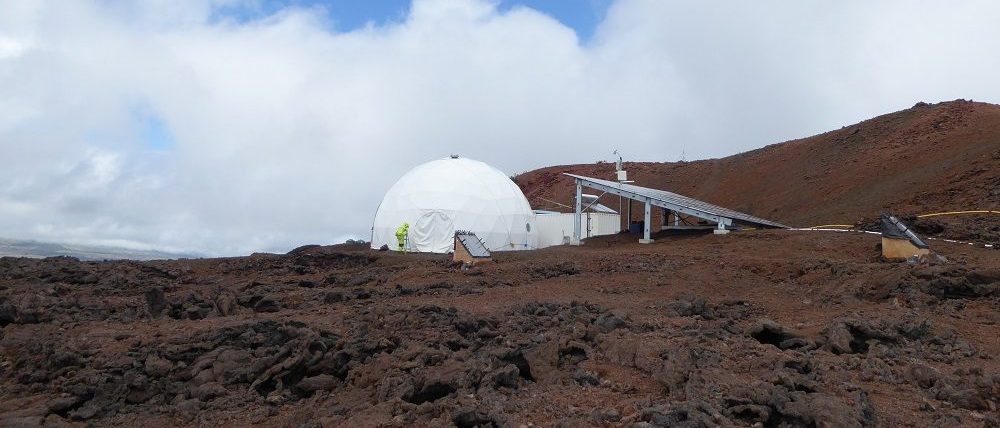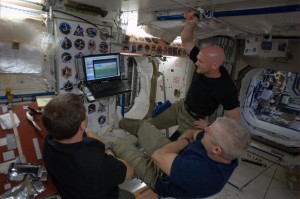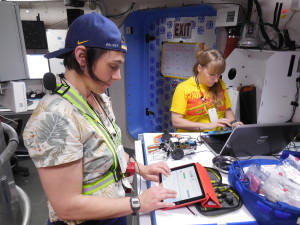What is a simulated astronaut?
Answering that question begins with addressing “what is a real astronaut?” which…is a bit more complicated than you might think.
Possible Answer #1: Astronauts are people who go to space
Yes, and no. Some astronauts go to space. When they do, it’s usually for 3-6 months, after training for 2-4 years or more. The rest of the time, astronauts are as down-to-Earth as the rest of us, with a bit more time spent in low-gravity environments like pools, and variable-gravity environments (planes flying parabolas).
Some astronauts, called management astronauts, do not fly at all. They organize, instruction, research, develop and do outreach.
At the moment, out of the pool of 85 US astronauts, only 50 fly. In one sense, that’s not a very big number. In another, that is nearly the number of total astronauts who have died since the inception of the astronaut program in 1959. So, in the last 50 years, the corps has expanded.
Another issue with this definition is that there are people who go to space but have paid for the privilege. They trained for the one time trip, but they aren’t space-farers so much as space tourists..and very fortunate ones at that. So, let’s try this again…
Possible Answer #2: Astronauts are people who go to space and work for NASA.
While this has generally been true in the US, it was never the case world-wide, won’t be the case here for very much longer. NASA is now very intentionally turning over the task of running people into space to semi-private (more on this later) commercial enterprises.
What this means for astronauts – people who wish to make careers out of going to space – is an open question. Will going to space be a career anymore, or will it be something that one just does now and again, as time, money and logistics permit?
Ok, one more time….
Possible Answer #3: Astronauts are Scientists.
DING! While the first class of astronauts were all test pilots, these days, astronauts are test-givers, test-designers and, more than anything else, test-takers. Astronauts typically do science for a living – before and after astronaut training.
But more than they do science, astronauts ARE science. They are measured and monitored. They are tested, physically, mentally, emotionally and socially. They are put through hoops and bent and twisted. At the end of it all, astronauts are expected to untwist, unbend, and spring back into shape..so that they can do it again the next day.
Here’s where being a simulated astronaut is extremely close to being one of the 50 men and women who are currently trained to go to into space for NASA as an astronaut: we simulated astronauts are science. We are scientists, too, largely. We have experiments to design and run. We hope to have results to report back to our colleagues and the community at large. Whether or not our individual experiments succeed or fail – whether our LED-powered crops grow or I find the most efficient and economical way to get a spacesuit clean – our physical presence in simulated space allows the rest of humankind to understand what happens to people in these environments. Do we start to stand closer to each other over time? Do we start fighting over things that didn’t used to matter? How can we keep from gaining weight when we’re living inside a box? How can we keep from losing it when all the food starts out as powder?
These are the kind questions that astronauts, simulated and real, help answer. The major difference between the two could be said to be one of efficiency. It’s more efficient to not send people to space if you can ask the same questions here on Earth in a space-like environment. That’s what simulated space is – remote, isolated, and highly structured – in order to test the mettle of human beings and support systems that could one day go to space.
So much like our counterparts who fly to the ISS, simulated astronauts are highly educated, highly motivated, highly fit individuals with a penchant for adventure, excitement and science (not always in that order). I’ve discovered in recent days that something else unites us, too: Our ability to inspire excitement about life, the universe and everything.
This excitement creates a kind of curtain between two words, eclipsing one in the umbra of the other. It doesn’t matter that I keep sticking “simulated” in front of the word “astronaut”. No one wants to hear it. All they hear is “astronaut”. And then, oh then, they get REALLY excited about it.
I am, of course, extremely pleased to see people getting excited – about space, about science, about human exploration. Out of pride in my job, and out of respect for the hard working men and women of the actual astronaut corps, I’m going to keep up asking people to harken unto the simulated portion of simulated astronaut. At the same time, I hope to keep seeing the ways in which people inspire themselves to greater levels of awesomeness when they come CLOSE to something that they think is an astronaut.
Case in point: The gentleman who wrote the email below checked out my CAR. Checked it out, DID NOT BUY IT, and wrote the following note.
Shey,
Thank you for your hospitality and showing us your car, unfortunately I’ve decided to keep looking. I’m wanting to be able to be able to put more junk in the trunk! I have attached a copy of the Carfax report I ran, so you guys can provide it to people coming to look, hopefully it helps.
I am going to gush a little for a minute here in that, despite not knowing you, it was truly amazing to be able to meet you. I have been enamored with space since I was a little kid in the Young Astronauts club at my middle school, and it has followed me into adulthood. Meeting someone that has a hand in that was awesome! Seeing someone with your level of education and dedication is truly an inspiration, and even prompted a Facebook post linking to your site. I will most definitely be following your progress as you go, and good luck in all of your future endeavors!
Thanks!
There it is. I simulate going to space, then stand back and watch the people of Earth get excited over lots of stuff, including not buying my car.
In the end, there is nothing “fake” about this mission. The job is to reproduce Mars to the best of our ability. The effect, at least on some, is very, very real.
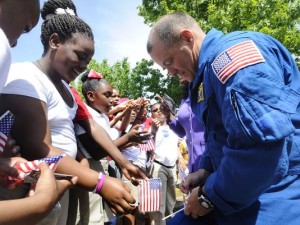 and also
and also 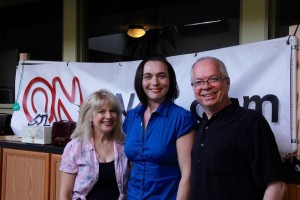 ___________________________________________
___________________________________________
PS: In addition to getting super excited that he was not going to buy a car from someone who is not an astronaut, that man had the cutest kid IN THE WORLD. Totally adorable on all fronts.
PPS: You say potato, I say space potato. Does being an astronaut pay a lot?
The starting salary for a NASA astronaut is around $51,298/year. If you stay in long enough, you’ll end up making a little over 100K. That’s the Federal pay schedule for you. Postman, pencil-pusher, army pilot or astronaut – you’ll be pulling in the big bucks, sort of, if you stay in it long enough.
How about being a simulated astronaut? Does that pay well, at least?
Nope. Sorry ya’ll. 🙂
The source of astronaut information for this post was NASA’s Astronaut Factbook
